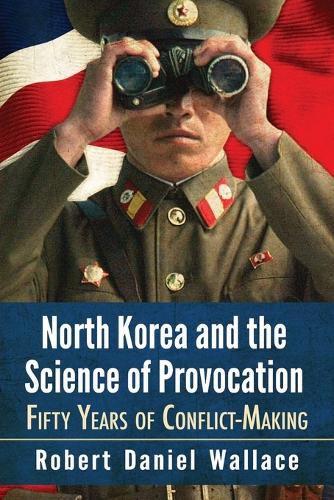Readings Newsletter
Become a Readings Member to make your shopping experience even easier.
Sign in or sign up for free!
You’re not far away from qualifying for FREE standard shipping within Australia
You’ve qualified for FREE standard shipping within Australia
The cart is loading…






This title is printed to order. This book may have been self-published. If so, we cannot guarantee the quality of the content. In the main most books will have gone through the editing process however some may not. We therefore suggest that you be aware of this before ordering this book. If in doubt check either the author or publisher’s details as we are unable to accept any returns unless they are faulty. Please contact us if you have any questions.
Why does North Korea consistently turn to provocative actions to achieve foreign policy goals? Are the actions of the Kim regime predictable or based on logical responses to the conditions faced by North Korea? In an examination of North Korean conflict over the past 50 years, this research is an effort to explain why the DPRK consistently uses conflict and force to interact with other states. Surprisingly, this type of research is rare due to the perceived lack of information on this isolated state, yet information is readily available to understand the ruling Kim regime’s foreign policy activities. Using three case studies and quantitative analysis of over 2,000 conflict events, his study examines the relationship between North Korea’s societal conditions and its propensity to engage in external conflict. These findings are viewed through the lens of diversionary theory, the idea that leaders use external conflict to
divert
domestic attention, as a possible explanation. By examining the actions of an isolated state such as North Korea and providing a template for conflict scholarship in general, this study provides an original perspective on how explain the intricate relationships between state-level activities and external conflict. This research provides insight into this reclusive nation and the Kim regime’s volatile relationship with the international community.
$9.00 standard shipping within Australia
FREE standard shipping within Australia for orders over $100.00
Express & International shipping calculated at checkout
This title is printed to order. This book may have been self-published. If so, we cannot guarantee the quality of the content. In the main most books will have gone through the editing process however some may not. We therefore suggest that you be aware of this before ordering this book. If in doubt check either the author or publisher’s details as we are unable to accept any returns unless they are faulty. Please contact us if you have any questions.
Why does North Korea consistently turn to provocative actions to achieve foreign policy goals? Are the actions of the Kim regime predictable or based on logical responses to the conditions faced by North Korea? In an examination of North Korean conflict over the past 50 years, this research is an effort to explain why the DPRK consistently uses conflict and force to interact with other states. Surprisingly, this type of research is rare due to the perceived lack of information on this isolated state, yet information is readily available to understand the ruling Kim regime’s foreign policy activities. Using three case studies and quantitative analysis of over 2,000 conflict events, his study examines the relationship between North Korea’s societal conditions and its propensity to engage in external conflict. These findings are viewed through the lens of diversionary theory, the idea that leaders use external conflict to
divert
domestic attention, as a possible explanation. By examining the actions of an isolated state such as North Korea and providing a template for conflict scholarship in general, this study provides an original perspective on how explain the intricate relationships between state-level activities and external conflict. This research provides insight into this reclusive nation and the Kim regime’s volatile relationship with the international community.